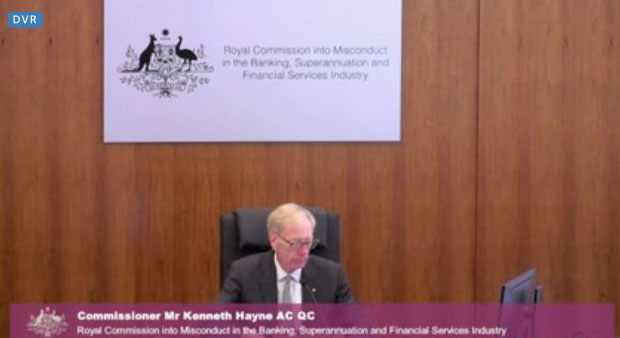Maurice Blackburn Lawyers has confirmed that it is preparing court proceedings against the major banks and brokers in regards to alleged breaches of the NCCP, according to The Adviser.
On Monday, media reports began circulating about rolling litigation being levelled at the major banks and brokers relating to alleged breaches of the National Consumer Credit Protection Act 2009 (NCCP Act).
The move follows on from questions asked by the Royal Commission into Misconduct in the Banking, Superannuation and Financial Services Industry over whether credit providers have adequate policies in place to ensure that they comply with “their obligations under the National Credit Act when offering broker-originated home loans to customers, insofar as those policies require them to make reasonable inquiries about the consumer’s requirements and objectives in relation to the credit contract, to make reasonable inquiries about the consumer’s financial situation, and to take reasonable steps to verify the consumer’s financial situation”.
Earlier this year, the royal commission was damning in its critique of the lenders’ policies when it came to ensuring customers can afford their home loans, with ANZ being called out for their “lack of processes in relation to the verification of a customer’s expenses”, and both Westpac and NAB revealing that there had been instances of their staff accepting falsified documentation for loans.
Further, Westpac recently admitted to breaches of responsible lending obligations when issuing home loans to customers and agreed to pay a $35 million civil penalty to resolve Federal Court proceedings.
While there has not been any systemic issues with arrears rates or housing affordability to date, Maurice Blackburn has suggested that the reliance on benchmarks, such as the Household Expenditure Measure, coupled with a softening property market and the “maturity of interest-only loans”, could “leave thousands in financial ruin, staring at the prospect of bankruptcy”.
Further, the law firm took aim at the mortgage broker market, relying on some controversial statistics from investment bank UBS regarding the third-party channel.
Court proceedings expected “in the coming months”
In a statement to The Adviser, Maurice Blackburn principal Josh Mennen confirmed that the law firm is pursuing legal action, stating: “A combination of banks’ relaxed lending standards and brokers’ involvement in loan sales has resulted in widespread debt over-commitment that threatens the stability of the broader economy. A survey of more than 900 home loans conducted by investment bank UBS found that around $500 billion worth of outstanding home loans are based on incorrect statements about incomes, assets, existing debts and/or expenses.
“This means 18 per cent of all outstanding Australian credit is based on inaccurate information, often caused by poor advice or misrepresentations by a mortgage broker eager to generate a sale commission.”
It should be noted that the figures quoted are in relation to a UBS report which asked borrowers about the accuracy of their home loan applications, and that representatives from several bodies — including ASIC — have called into question the weight of this response, arguing that “for many consumers the additional work and additional steps that banks and other lenders are taking to verify someone’s financial situation won’t be apparent to them”.
For example, ASIC’s Michael Saadat, senior executive leader for deposit takers, credit and insurers, said last year that “consumers are probably not the best judge of what banks are doing behind the scenes to make sure borrowers can afford the loans they’re being provided with”.
In his statement to The Adviser, Mr Mennen continued: “A staggering 30 per cent of loans surveyed had been issued based on understated living costs and around 15 per cent on understated other debts or overstated income.
“Add to the equation the fact that a huge proportion of mortgage loans issued over the past decade were ‘interest-only loans’. These loans have an initial period (usually five years) where only the interest on the loan is repaid. However, after the interest-only period ends and the principal is also paid down, the loan repayments can increase between 30–60 per cent.”
While the principal conceded that this “problem has been contained” by investors being able to sell their interest-only investment properties and therefore “often fortunate enough to sell the investment property at a gain or at least break even, clearing the mortgage without too much pain,” he suggested that the current environment in which interest rates are rising, while some property markets (such as Sydney and Melbourne) are declining, could be cause for concern.
“These factors, in combination with the maturity of interest-only loans, will further drive up distress sales in a stagnant or contracting market and may leave thousands in financial ruin, staring at the prospect of bankruptcy,” the lawyer said.
Realising a prediction from UBS analysts that the evidence of “mortgage mis-selling and irresponsible lending” found during the royal commission could result in the banks being subject to “very costly” class actions, Maurice Blackburn is now mounting legal cases against banks and/or brokers.
Mr Mennen said: “We believe that, as consumers losses are crystallised, many will have strong claims for compensation against their lender and/or mortgage broker for breaches of the National Consumer Credit Protection Act 2009 (NCCP Act) for failing to comply with responsible lending obligations including by not making reasonable inquiries and verifications about customers’ ability to repay the loan.
“We are acting for many such customers and are preparing to commence court proceedings against major banks in the coming months.”
It is not yet known which brokers or broker groups, if any, will be targeted in the legal action.
However, the corporate regulator has reiterated its view that lenders should be held accountable for breaches of responsible lending obligations, irrespective of whether the loan was broker-originated.
In its most recent Enforcement Outcomes report, which outlines the action the financial services regulator has taken over the first half of the calendar year, the Australian Securities and Investments Commission (ASIC) stressed that lenders should not offload blame to third parties when a loan is found to be in breach of responsible lending obligations.









